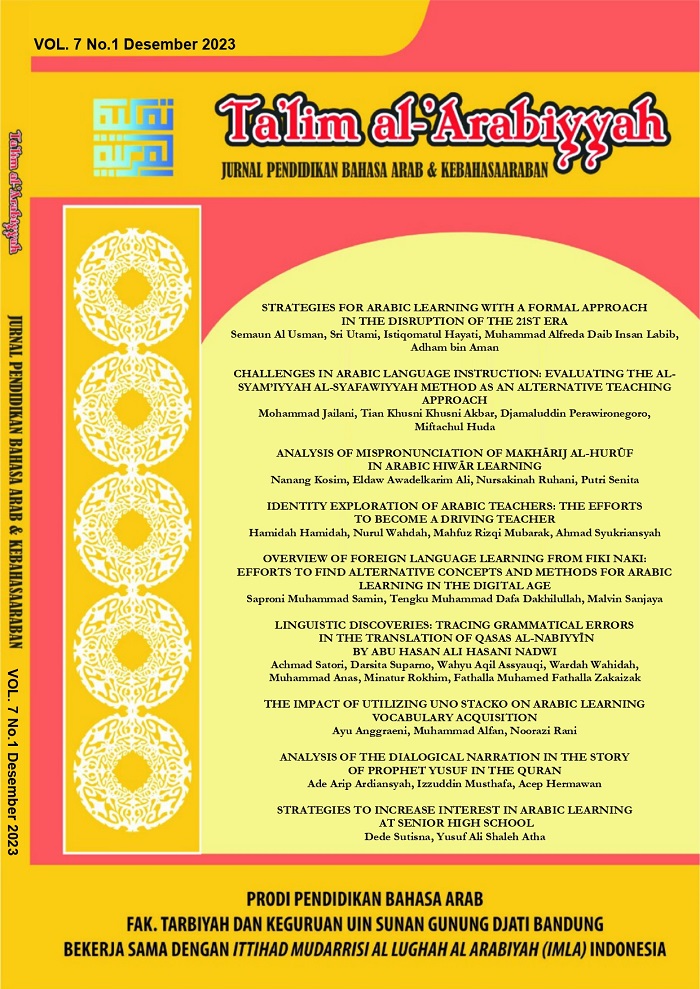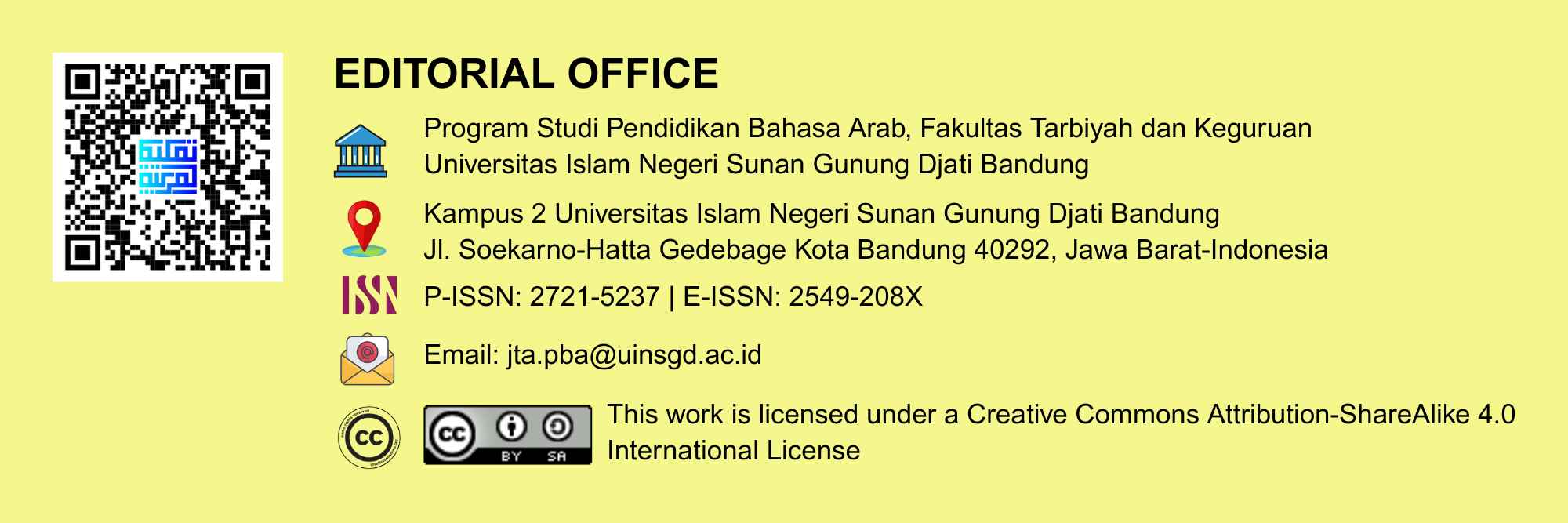Identity Exploration of Arabic Teachers: the Efforts to Become a Driving Teacher
DOI:
https://doi.org/10.15575/jpba.v7i2.24100Keywords:
Arabic Teachers in Kalimantan, The Identity Of Arabic Teachers, Driving TeachersAbstract
To realize the driving of teachers as planned by the government, it cannot be separated from various forms of professional competence that must be mastered as teachers’ identity. However, the identity, which is the qualification standard, is not evenly shared by Arabic language teachers, especially in several districts in the Kalimantan region. Therefore, this research aims to describe the identity of Arabic teachers as driving teacher resources in Arabic language learning to become driving teacher figures in the Kalimantan Region. This research uses a mixed method, combining qualitative and quantitative methods using a concurrent triangulation design. The research results show that the identity of Arabic teachers in Central Kalimantan is formed from their experiences so far, which require them to do more even though some do not have a non-Arabic language educational background. The emotional aspect of Arabic teachers who teach the Arabic language used in the Al-Quran and hadith fosters the teacher's enthusiasm to become a motivator, inspiration, and facilitator who always looks for solutions to problems in learning Arabic. Even though the teachers are located in the regions, this does not reduce the teachers' identity as teachers with pedagogical, social, personal, and professional competencies. Individuals who play the role of teachers always learn continuously throughout life and have the moral, emotional, and spiritual maturity to behave according to a code of ethics: planning, implementing, reflecting, and evaluating learning. This research recommends exploring the identity of Arabic teachers not only at the regional level but also at the national level.
References
Alsup, J. (2005). Teacher Identity Discourses: Negotiating Personal and Professional Spaces. Routledge. https://doi.org/10.4324/9781410617286
Creswell, J. W., Hanson, W. E., Clark Plano, V. L., & Morales, A. (2007). Qualitative Research Designs: Selection and Implementation. The Counseling Psychologist, 35(2), 236–264. https://doi.org/10.1177/0011000006287390
Djais, K. M. (2020). Analisis Kesulitan Belajar Hiwar pada Pembelajaran Bahasa Arab Di Madrasah Negeri Ternate. JURNAL DODOTO, 1(02), 78-91. Retrieved from https://jurnal.ummu.ac.id/index.php/dodoto/article/view/399
Falah, A. (2016). Problem dan Tantangan Pembelajaran Bahasa Arab Pada Tingkat Madrasah. Arabia: Jurnal Pendidikan Bahasa Arab, 8(1), 29-46. https://doi.org/10.21043/arabia.v8i1.1946
Felix, C.V. (2020), "The Role of the Teacher and AI in Education", Sengupta, E., Blessinger, P. and Makhanya, M.S. (Ed.) International Perspectives on the Role of Technology in Humanizing Higher Education (Innovations in Higher Education Teaching and Learning, Vol. 33), Emerald Publishing Limited, Leeds, pp. 33-48. https://doi.org/10.1108/S2055-364120200000033003
Golzar, J. (2020). Teacher identity formation through classroom practices in the post-method era: A systematic review. Cogent Education, 7(1), 1853304. https://doi.org/10.1080/2331186X.2020.1853304
Habibah, N. (2016). Lingkungan Artifisial dalam Pembelajaran Bahasa Arab. Arabiyat: Jurnal Pendidikan Bahasa Arab dan Kebahasaaraban, 3(2), 173-196. https://doi.org/10.15408/a.v3i2.4038
Hamidah, H., Audina, N. A., & Mubarak, M. R. (2022). How is an Arabic Lecturer’s Personality Competence as Expected by Students? An Analysis of Students’ Perceptions in Indonesia. Arabiyatuna: Jurnal Bahasa Arab, 6(2), 399-416. https://doi.org/10.29240/jba.v6i2.5088
Hammersley, M., & Traianou, A. (2012). Ethics in Qualitative Research: Controversies and Contexts. SAGE Publications Ltd. https://doi.org/10.4135/9781473957619
Hanna, F., Oostdam, R., Severiens, S. E., & Zijlstra, B. J. H. (2019). Domains of teacher identity: A review of quantitative measurement instruments. Educational Research Review, 27, 15–27. https://doi.org/10.1016/j.edurev.2019.01.003
Huberman, M., & Miles, M. B. (2002). The Qualitative Researcher’s Companion. SAGE. Retrieved from https://uk.sagepub.com/en-gb/asi/the-qualitative-researchers-companion/book7103
Idzhar, A. (2016). Peranan Guru dalam Meningkatkan Motivasi Belajar Siswa. Jurnal Office, 2(2), 221-228. https://doi.org/10.26858/jo.v2i2.2956
Ilhami, Z. (2020). Persepsi Siswa Tentang Profesionalisme Guru Ditinjau Dari Kompetensi Pedagogik Terhadap Motivasi Belajar Bahasa Arab. Studi Arab, 11(2), 115-128. https://doi.org/10.35891/sa.v11i2.2464
Ilmiani, A. M., Wahdah, N., & Mubarak, M. R. (2021). The application of Albert Bandura’s Social Cognitive Theory: A Process in Learning Speaking Skill. Ta’lim al-’Arabiyyah: Jurnal Pendidikan Bahasa Arab & Kebahasaaraban, 5(2), 181-192. https://doi.org/10.15575/jpba.v5i2.12945
Islam, A. M. S. (2015). Faktor Demotivasi Pembelajaran Bahasa Arab dalam Perspektif Siswa Madrasah. Arabiyat: Jurnal Pendidikan Bahasa Arab dan Kebahasaaraban, 2(1), 1-16. https://doi.org/10.15408/a.v2i1.1511
KEMENDIKBUD RI (Director). (2020, July 3). Merdeka Belajar Episode 5: Guru Penggerak. [Video]. Youtube. https://www.youtube.com/watch?v=X6vP4AkEsLM
Krzywacki, H. (2009, November 13). Becoming A Teacher: Emerging Teacher Identity In Mathematics Teacher Education. Retrieved from https://peterliljedahl.com/wp-content/uploads/Sample-Thesis-Krzywacki-Vainio.pdf
Lawrence, L., & Nagashima, Y. (2020). The Intersectionality of Gender, Sexuality, Race, and Native-speakerness: Investigating ELT Teacher Identity through Duoethnography. Journal of Language, Identity & Education, 19(1), 42–55. https://doi.org/10.1080/15348458.2019.1672173
Moustakas, C. (1994). Phenomenological Research Methods. SAGE Publications, Inc. https://doi.org/10.4135/9781412995658
Muhammad Zikran Adam, & Laily Fitriani. (2023). Implementation of the Drill Method in Learning Arabic with a Communicative Approach. Journal of Arabic Language Learning and Teaching (JALLT), 1(1), 1–12. https://doi.org/10.23971/jallt.v1i1.70
Mulyasa, H. E. (2021). Menjadi Guru Penggerak Merdeka Belajar. Bumi Aksara.
Mustofa, M. (2007). Upaya Pengembangan Profesionalisme Guru di Indonesia. Jurnal Ekonomi dan Pendidikan, 4(1), 76-88. https://doi.org/10.21831/jep.v4i1.619
Nazhimah, S., & Faqihulhikam Mohammad. (2023). Implementation of the Contextual Teaching and Learning Model in the Al-Liqo Al-Usbuiyyah Program: Case Study in Higher Education in Indonesia. Journal of Arabic Language Learning and Teaching (JALLT), 1(1), 35–46. https://doi.org/10.23971/jallt.v1i1.131
Rahayu, S. A. P. (2019). Peran Kepribadian Guru dalam Memotivasi Belajar Siswa. Vicratina: Jurnal Pendidikan Islam, 4(1), 54-74. Retrieved from https://jim.unisma.ac.id/index.php/fai/article/view/3160/2837
Rochman, R. N., Abdurrahman, M., & Ali, M. (2022). Analisis Kegiatan Forum MGMP Bahasa Arab dalam Pengembangan Kompetensi Pedagogik Guru Bahasa Arab di Jawa Tengah. Lisanul Arab: Journal of Arabic Learning and Teaching, 11(1), 1-8. https://doi.org/10.15294/la.v11i1.56910
Safari, P. (2018). A critical reflection on (re)construction of my identity as an English language learner and English teacher. Professional Development in Education, 44(5), 704–720. https://doi.org/10.1080/19415257.2017.1387866
Sekolah Penggerak. (2021). Sekolah Penggerak. Retrieved from https://sekolah.penggerak.kemdikbud.go.id/
Sugiyono. (2015). Memahami Penelitiaan Kualitatif. Cv.Alfabeta.
Titu, P. (2019). Understanding Teacher Professional Identity Development: An Exploration of Secondary Science Teacher Beliefs and Practices Through Reflective Practice [Desertasi, The University of Minnesota]. Retrieved from https://conservancy.umn.edu/handle/11299/209009
Tohidian, I. (2016). How do my students think about ME as an English-language teacher? Reflective Practice, 17(6), 739–751. https://doi.org/10.1080/14623943.2016.1207622
Undang-Undang Nomor 14 Tahun 2005. (2005). Retrieved from https://jdih.kemenkeu.go.id/fulltext/2005/14tahun2005uu.htm
Van Lankveld, T., Schoonenboom, J., Volman, M., Croiset, G., & Beishuizen, J. (2017). Developing a teacher identity in the university context: A systematic review of the literature. Higher Education Research & Development, 36(2), 325–342. https://doi.org/10.1080/07294360.2016.1208154
Wahdah, N., Hamidah, H., Mubarak, M. R., & Nurtianto, L. (2023). Investigating The Arabic Teachers Efficacy to Become a Driving Teacher. Arabiyat: Jurnal Pendidikan Bahasa Arab Dan Kebahasaaraban, 1(1), 36-49. https://doi.org/10.15408/a.v1i1.32146
Zein, M. (2016). Peran Guru dalam Pengembangan Pembelajaran. Jurnal Inspiratif Pendidikan, 5(2), 274-285. https://doi.org/10.24252/ip.v5i2.3480
Downloads
Published
How to Cite
Issue
Section
Citation Check
License
Authors who publish in Ta'lim al-'Arabiyyah: Jurnal Pendidikan Bahasa Arab dan Kebahasaaraban agree to the following terms:
- Authors retain copyright and grant the journal right of first publication with the work simultaneously licensed under a Creative Commons Attribution-ShareAlike 4.0 International (CC BY-SA 4.0) License that allows others to share the work with an acknowledgment of the work's authorship and initial publication in this journal.
- Authors are able to enter into separate, additional contractual arrangements for the non-exclusive distribution of the journal's published version of the work (e.g., post it to an institutional repository or publish it in a book), with an acknowledgment of its initial publication in this journal.
- Authors are permitted and encouraged to post their work online (e.g., in institutional repositories or on their website) prior to and during the submission process, as it can lead to productive exchanges, as well as earlier and greater citation of published work (See The Effect of Open Access).
![]()
Ta'lim al-'Arabiyyah: Jurnal Pendidikan Bahasa Arab dan Kebahasaaraban is licensed under a Creative Commons Attribution-ShareAlike 4.0 International License.
Based on a work at https://journal.uinsgd.ac.id/index.php/Talim








